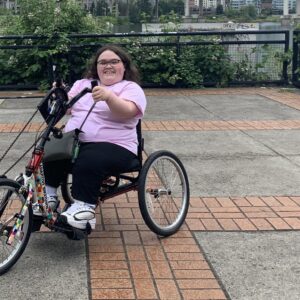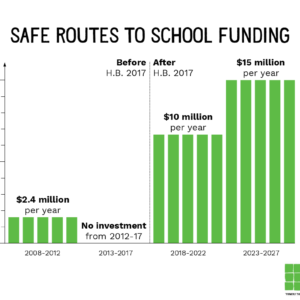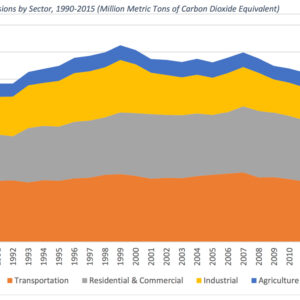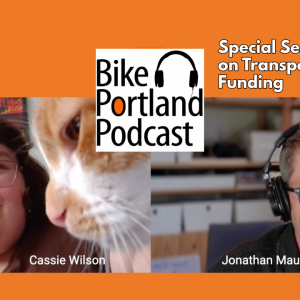As transportation advocates of all stripes gird for what’s going to be a very intense session of the Oregon Legislature next year, there’s a new report that I think should required reading: Oregon in Motion: The development and impacts of HB 2017 and recommendations for a 2025 transportation package (PDF).
As the title says, all eyes are on 2025 because lawmakers are expected to craft and (try to) pass another massive spending and policy plan, the likes of which haven’t been seen since the $5.3 billion package passed in 2017. The importance of this moment needs to be understood — that’s why I asked the report’s author, Cassie Wilson, to join me for an interview.

Cassie is a disability rights and transportation advocate who you might recall from our profile of her in 2022. This past legislative session, Cassie was a legislative aide for the Oregon House of Representatives. She wrote the Oregon in Motion report as an intern with nonprofit land-use and environmental advocacy group, 1000 Friends of Oregon.
The 60-page report is an excellent, insider’s look at the sausage-making that led to HB 2017, what that package did (and didn’t do), and what Oregon’s next big funding bill should include. And that’s just the start of what you can learn by reading it. I loved the sections with quotes from activists and insiders who were on the front lines in 2017.
Asked for her take on 2025, Cassie pointed out there’s one big difference from last time around. “Part of what House Bill 2017 did was create the Joint Committee on Transportation. Before that, transportation committees were created more on an as-needed basis. And so, this is kind of the first time that we’re going into a transportation package with a committee that has been consistently working on transportation in the years since the last one.”
That’s an important point; and what will be even more important is which lawmakers are leading that committee. Right now it’s Co-Chair Rep. Susan McLain, a centrist when it comes to some of the more progressive ideas of another JCT member, Rep. Khanh Pham. As I’ve watched this committee in the past year or so, I’ve seen a palpable tension between Reps Pham and McLain so it will be interesting to see how that materializes as flags are planted leading up to a new bill.
Asked what we should look for next session, Cassie said there will definitely be talk of a new funding mechanism. There was a flurry of activity this session around re-assessing the state’s Weight Mile Tax, there’s been a lot of talk about making sure all road users pay their “fair share,” and with recent cooling on tolls by Governor Tina Kotek, how ODOT raises money will be just as big of a conversation as what they spend it on.
“There an ongoing conversation around electric vehicles and how they pay into the system,” Cassie said in our interview. “There’s also been a lot of talk since 2017 about micromobility and about e-bikes… so I think a lot of people are looking to the 2025 package to get those things across the finish line.”
HB 2017 will be remembered as a landmark package in large part because of how it diversified ODOT funding beyond just highways for car users. Cassie’s report details how the Statewide Transit Improvement Fund has been a boon for rural transit providers and how programs like Safe Routes to School have flourished thanks to new, dedicated funding in the bill.
In addition to funding projects and programs, HB 2017 also included important transportation policy, and its 2025 sibling will follow suit. Cassie said it’s a time to discuss changes to how the Oregon Transportation Commission oversees ODOT policy and to push for better funding transparency so all Oregonians can see what our money is being spent on.
“Don’t be intimidated by the 60 pages of length,” Cassie shared as a parting shot. “There’s an executive summary or you can check out the table of contents and skip to your favorite parts. I think that it’s a really good primer for what’s to come next year and hopefully will inspire folks to dream big for the next package.”
I couldn’t agree more. Do yourself a favor and check out the report. And join me in thanking Cassie and 1000 Friends of Oregon for putting it together!








Thanks for reading.
BikePortland has served this community with independent community journalism since 2005. We rely on subscriptions from readers like you to survive. Your financial support is vital in keeping this valuable resource alive and well.
Please subscribe today to strengthen and expand our work.
I think of folks like Cassie every time I see a sidewalk commandeered by our well meaning houseless neighbors.
I always pay attention to what leading Repubs have to say about transportation funding. So when Gov. Kotek recently cancelled the regional tolling program, I was interested to read Rep. Kevin Mannix’s reaction which boiled down to the following:
So I’m guessing that in the next full legislative session, something like the MyOreGO program will become law for all drivers in Oregon. Every vehicle will have a little data-collector box device that will report miles traveled to the state and each driver will be charged ten cents per mile (or whatever), with the payment coming straight out of your bank account.
You can bet that Repub legislators ain’t happy about all of these EVs (lookin’ at you, Tesla bros!) using the roads for free, while red-blooded Murcan truckers are paying for the roads with their 42-gallons-per-tank gas taxes.
It will be really interesting to see what kind of carve-out in the legislation Repubs will try to get for rural Oregonians, who (they will argue) can’t HELP driving long distances b/c of where they live (NOT their fault!). So maybe if you live in Klamath Falls you’ll pay seven cents per mile but if you live in Eugene or Portland you’ll pay ten cents per mile. And that’s not even considering the EQUITY concerns, like if you are from a marginalized community you pay little or nothing. So we’ll see.
Couldn’t they just check odometer readings when you renew your tags instead of requiring a little data-collector box in every car? Seems less invasive, but I suppose having a large bill every 2 years is less palatable than a small bill every month.
Because people only want to pay for the miles they actually drive in Oregon, not in the other states they may visit who use other methods to pay for their roads.
Doesn’t DEQ do odometer readings already? Pretty simple to assess a road use fee based on that data with any vehicle type modifier you want.
No need for spyware
Get ready for the spyware! That little device will also “help you drive better,” by tracking accelerations, hard braking, etc. All of these measures are now standard, and don’t forget your phone already collects all of this data. Soon there will be laws requiring that the data be shared with law enforcement when you are involved in a crash.
https://www.nytimes.com/2024/03/11/technology/carmakers-driver-tracking-insurance.html
Why not use those EZ Pay transponders that other states use to collect tolls? ODOT could place data collection devices similar to toll stations but call them something else, and collect fees on miles driven between each marker.
Calculating the correct mileage by reading pings on such devices wouldn’t work very well, unless the road system had an unimaginable density of them!
Those heavy-duty trucks are harder on our highways, and should pay more per mile than typical sedans.
I agree, and they already do.
But maybe their fees could be adjusted so they’d pay a scaled per-mile rate and a lot of other fees could be eliminated.
Your comment was informative to me, thanks.
Please tho rural Oregonians are not your enemy: my dad was born in, and my aunt and her son still lives in Lostine, OR.
My aunt and unce live off my uncle’s pension as a former forest service official whose job was to make sure cattle ranchers didn’t destroy the Wallowa forest.
And by raising a few head of cattle every year which they deliver to their customers in Portland metro and visit their daughter and grandkids in Molalla.
It is 10 miles to the Safeway in Enterprise and an hour’s drive to LaGrande to Walmart or to see a movie–don’t they deserve to see a movie?
Its alot of miles. But they love it there as do I. Its their home.
My great, great grandfather moved from West Virginia to Wallowa in 1875. Before that his scotch-irish ancestors were transplanted from poverty stricken Scottish lowlands to Ireland where they were dirt poor.
Should they move to Portland? How would they afford it? Rural skills of livestock raising and alfalfa growing dont get you far in Portland.
Wallowa county’s median income for a houshold is 50,000, average home price is 408,000 which has almost tripled in recent years.
Donel, you might be interested in a book titled “Albion’s Seed.” I’m part Scotch Irish too, and the book is about the different areas of Britain that Americans originate from, and where in America those immigrants settled. Really it’s a book about the persistence of culture, how the cultures in different regions of America derive from the originating cultures in the British Isles. Things like food and language, and a bunch of other things too.
My mother always called a pan a “skillet.” Good Scotch-Irish word. Incidentally, “red-neck” comes from the red handkerchiefs around their necks that the Scotch-Irish wore in battle. Also, there’s a reason why Southerners fry food, and Bostonians bake it.
(My mother’s house had indoor plumbing, but her grandmother down the road was still using an outhouse.)
The word “skillet” is common in England too, since Norman times. Wiktionary: Old French escuëlette, diminutive of escuëlle (“a porringer”), (French écuelle), from Vulgar Latin scutella, diminutive of scutra, scuta (“tray, dish”). Compare scuttle (“basket”).
The name “Kennedy” we associate in the US with Ireland, but in fact it has been common in England and Scotland too for hundreds of years. The reality is that for thousands of years the peoples of the Atlantic Northwest of Europe have been migrating to each others territories along with their cultures, including from the islands back to the mainland (think Brittany in France, not to mention the Hundred Years War in which England invaded France, mid-1300s to 1453). Their migrations to America (and Argentina and Australia for that matter) were part of that same process – they not only brought themselves, their names, cultures, and way of cooking, not to mention pots and pans, games, horses, and bicycle terms.
Our community bike shop here in Greensboro NC is trying to label bike parts bins in both English and Spanish as we have a lot of Spanish speakers here. Part of our problem is that our English speakers often don’t know what the parts are called in English, you know, that thing the chain goes on? is it a sprocket, a chainring, a crank, a freewheel, or a cassette? But it gets even more confusing in Spanish: there’s the terms used at bike shops among bike mechanics in Havana versus those mechanics in Seville Spain, versus Mexico City. Then there’s the generic terms that non-bicyclists use, plus old colonial terms, plus modern Euro-Spanish (Franco-Italian) terms.
“Redneck” is more complex, it has lots of reasonable word origins including farmer’s tans, but the most likely is from South Africa, again Wiktionary: From Afrikaans rooinek, from rooi (“red”) + nek (“neck”). The term refers to South Africans of British descent, who were perceived by Afrikaners to wear headgear (such as solar topees or no hat at all) which was inadequate in protecting them from sunburn, and thus caused them to have red necks. Other theories include the term being a reference to the red collars of 19th-century British military uniforms or to the red markings that British-South African farmers painted on their imported merino sheep.
Trick question! It’s a gear!
Also pulley, derailleur, differential, flywheel, switch…
We all deserve lots of things, but the crux is it has to be paid for.
So how do you suggest rural Oregonians help pay for the roads they use? Gas tax, apparently to our incompetently run Transportation Departments, isn’t enough.
So what do you suggest to pay for those potholes to get filled on your aunt’s and uncle’s drive to see a movie?
Or how to pay to have safe bike lanes put in on those roads they also use?
The fact that we can’t afford to maintain our road indicates that we have too many of them. The pragmatic and “moderate” solution would be to decommission many of them for long-term fiscal solvency.
I know, how about farmers pay for their own roads? They could do it through a collective mechanism known as “taxes”. Then they could in turn charge starving urban dwellers exponentially high prices for the food the farmers produce. Of course, the ungrateful urban dwellers could in turn use the same collective tax method and offer to pay for the farmer’s roads to get food to the urban dwellers cheaper, as a form of subsidy.
You nailed it, Solar. Building and maintaining roads into those rural areas around Lostine is expensive, and they benefit many fewer people, yet we all get to pay for them. Is that fair?
When people choose to live way out in the boonies, yet they want high-speed internet, do we all pay for it? No, in most cases the cable company charges them for the connection, or they just can’t get it b/c it’s too far.
These are issues we haven’t confronted, or haven’t had to confront, b/c DOTs have always been able to find the funds for improvements over time. But that can’t last forever and we will need to make some hard choices.
“Fair” is probably not a word that belongs in any policy discussions. It would be better to start from whether we want our rural areas to be populated or not, and then design a policy to achieve that.
BTW, we do subsidize rural internet service.
I’m starting to think that a lot of urban dwellers are not using this time to properly prepare for the coming climate crisis to the point where I am beginning to think no one really believes in it. Maybe you are right and its a waste of money to maintain roads outside of a major city? Maybe WTLBCTOTL is right and those roads should be decommissioned since not enough people use them?
Maybe urban dwellers can grow their own foodstuffs since there will no longer be any way for the agriculture to reach them?
Change is coming and some people still refuse to learn self sufficiency or understand the co-dependency modern life has forced on us all while expecting others to do all the work for them until all of a sudden those people are no longer able or willing to provide for them.
One more thing, do you think the rural hillbillies benefit more from having high speed interne than you benefit from having food? I am not sure you understand how precarious your position is in the modern food supply chain.
FWIW, it’s city/town roads that I was thinking should be decommissioned. The vast majority of them do not serve a essential societal purpose (e.g. major freight route) and exist merely for the convenience of people driving SUVs with studded tires on asphalt.
Them “redundant” city/town roads make wonderful smooth pavement for riding toys like bicycles, not to mention remove runoff from storms and household sewage into sewers, protect water mains from heavy vehicles, provide addresses for households, access to emergency vehicles during fires and heart attacks, delivery of Amazon gadgets, and parallel routes after 9.5 earthquakes.
When can we start decommissioning urban residents who do not participate in the only essential societal purpose of procreation? Not sure we need to do anything that supports the modern childless life of leisure many urban residents cling to.
This opens up an interesting question: does society benefit from having a robust agricultural community and people living in rural areas? If so, the question looks like funding schools. If not, it looks more like user pays.
And yet the enlightened urban dwellers constantly look down their noses at those rural folk.